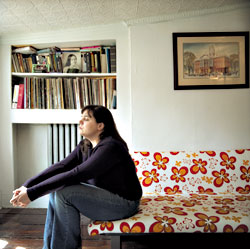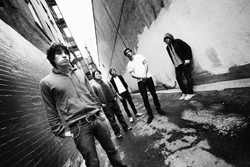“It’s weird to think that if you edit a few pieces of music together, someone can think, ‘Wow, that guy’s got chops,'” acknowledges Gregg Gillis, the Pittsburgh-based mash-up maestro known professionally as Girl Talk. “I don’t know how that came to be.”
It might be weird, but in Gillis’ case, the description is totally necessary. A pumping 42-minute megamix composed of hundreds (if not thousands) of tiny pop-song fragments, Night Ripper, Girl Talk’s third album, is as legitimate an example of instrumental virtuosity as your dad’s collection of live Hendrix bootlegs. Gillis’ instruments are his digital editing software and his voracious musical appetite; his playing is not just beat-matching or layering the vocals of one song over the music of another, but using prerecorded sounds the way a guitarist uses chords. If nearly every sample on Night Ripper didn’t trigger a flash of recognition in your mind, you’d have no reason to assume the CD wasn’t the product of some supremely ADD-afflicted computer-music wunderkind.
Of course, that nearly every sample does trigger a flash of recognition only increases Night Ripper‘s artistic value. Like Hendrix reclaiming “The Star Spangled Banner” for a nation of young people conflicted about the meaning of their patriotism, Gillis’ music is about ideas as much as groove; he loves juxtaposing bits of caveman misogyny and queer-culture jubilation, or emphasizing post-punk’s sexless throb with R&B’s sensual grind. In one memorable passage, Paul McCartney compares notes on seducing women with the members of Pavement and 2 Live Crew—perhaps a pop-culture first.
On the phone, Gillis resists accepting too much credit for his accomplishment. “I didn’t pioneer this kind of thing,” he says, pointing to decades-old work by Negativland and John Oswald, who coined the term “plunderphonics” to describe his brand of micromanaged audio collage. “It’s a lot more intense of a process when you’re doing it on tape as opposed to digitally, but as far as precision goes, Oswald was almost there.”
To Gillis, that precision is what distinguishes his music from that of his predecessors; it’s an element he credits in part to “the heavy influence of IDM”—the so-called “intelligent dance music” made by Aphex Twin and Squarepusher, among others. He says his stuff is “the next logical step” in a musical-technological continuum that includes remixes, sample-based hip-hop, and the mash-up craze that erupted a few years ago. “It’s fairly easy to understand what I’m doing because of that precedent,” he admits. “Whereas 20 years ago, people wouldn’t have had those building blocks.”
What also sets Gillis apart from his peers both past and present is his raucous live show, which more often than not ends up entailing some amount of nudity. “I’ve been going to laptop shows for forever,” he says, “and they’re pretty boring. So when I started playing shows in 2000 and 2001, I wanted to do something rowdy. There’s not a lot of freedom when you’re stuck behind a computer, so I did a rock-style show,” complete with lots of running around and onstage acrobatics. Gillis considers his approach the natural outgrowth of living in Pittsburgh, where “there isn’t anyone doing what I’m doing. But there is a vibrant rock scene with a bunch of midsize bands.”
Still, Gillis counts at least one worry most rock bands don’t have to contend with: the prospect of instant obsolescence. Since a large part of Night Ripper‘s appeal lies in its cultural currency—the way it complicates and comments on songs being played on the radio right now—there’s an expectation of immediacy to a Girl Talk show, an expectation that Night Ripper‘s Ludacris and Ciara samples will have a harder time satisfying as the days and weeks tick by. “It’s bizarre,” Gillis laughs. “I never wanted to get lumped into a DJ thing, but I actually have to do a similar thing. When new songs come out, it’s a mad rush to see what I like. But all a DJ has to do is find what it blends into. For me, people expect me to have a whole new mix ready; they anticipate my using bits and pieces of the latest stuff. It’s my version of writing songs.”








